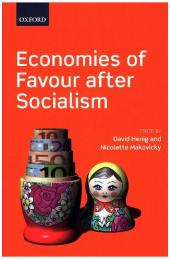 Neuerscheinungen 2016Stand: 2020-02-01 |
Schnellsuche
ISBN/Stichwort/Autor
|
Herderstra▀e 10
10625 Berlin
Tel.: 030 315 714 16
Fax 030 315 714 14
info@buchspektrum.de |

David Henig, Nicolette Makovicky
(Beteiligte)
Economies of Favour after Socialism
Ed. by David Henig and Nicolette Makovicky
2016. 256 p. 240 mm
Verlag/Jahr: OXFORD UNIVERSITY PRESS; OUP OXFORD 2016
ISBN: 0-19-968741-2 (0199687412)
Neue ISBN: 978-0-19-968741-1 (9780199687411)
Preis und Lieferzeit: Bitte klicken
A volume on the economics of favours and how they function as socially efficacious actions in post-socialist regions including central, eastern, and south eastern Europe; the former Soviet Union; Mongolia; and post-Maoist China.
Since the onset of the global economic crisis, activists, policy makers, and social scientists have been searching for alternative paradigms through which to re-imagine contemporary modes of thinking and writing about economic orders. These attempts have led to their re-engagement with fundamental anthropological categories of economic analysis, such as barter, debt, and the gift. Focusing on favours, and the paradoxes of action, meaning, and significance they
engender, this volume advocates for their addition to this list of economic universals. It presents a critical re-interrogation of the conceptual relationships between gratuitous and instrumental behaviour, and raises novel questions about the intersection of economic actions with the ethical and
expressive aspects of human life.
Scholars of post-socialist politics and society have often used ┤favour┤ as a by-word for corruption and clientelism. The contributors to this volume treat favours, and the doing of favours, as a distinct mode of acting, rather than as a form of ┤masked┤ economic exchange or simply an expression of goodwill. Casting their comparative net from post-socialist Central, Eastern, and South Eastern Europe; to the former Soviet Union, Mongolia, and post-Maoist China, the contributors to this volume
show how gratuitous behaviour shapes a plethora of different actions, practices, and judgements across religious and political life, imaginative practices, and local moral economies. They show that favours do not operate ┤outside┤ or ┤beyond┤ the economic sphere. Rather, they constitute a distinct mode
of action which has economic consequences, without being fully explicable in terms of transactional cost-benefit analyses.
Assembling a stellar collection of authors to address an exceptionally well formed and originalset of questions, this book achieves for favours what Humphrey and Hugh-Jonesă Ct. s seminal Barter, Exchange, and Value did for barter: the creation of a sophisticated new category for comparative analysis. It also brings the anthropology of ethics into conversation with economic anthropology in a highly creative way, greatly to the benefit of both: a work of real importance. James Laidlaw, William Wyse Professor of Social Anthropology, University of Cambridge
Nicolette Makovicky is Lecturer of Russian and East European Studies at the University of Oxford. She is the editor of Neoliberalism, Personhood, Postsocialism: Enterprising Selves in Changing Economies (Ashgate, 2014) and has published extensively on informal economic activity in Central Europe.
David Henig is Lecturer in Social Anthropology at the School of Anthropology and Conservation, University of Kent. His research, conducted mainly in the Balkans and Central Asia, focuses largely on vernacular Islam, sacred landscape, exchange theory, and more recently on linking anthropology with global transnational history, diplomacy, international relations, and geopolitics. He has authored numerous publications on Islam, dervish orders, Muslim politics, and
post-socialism.


